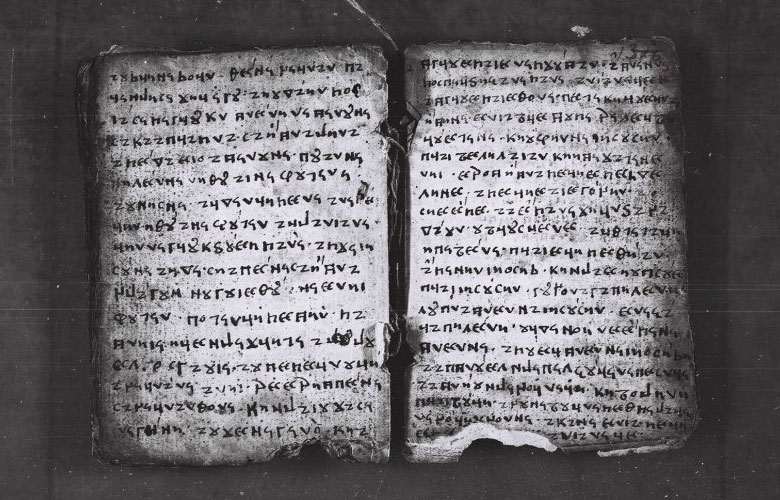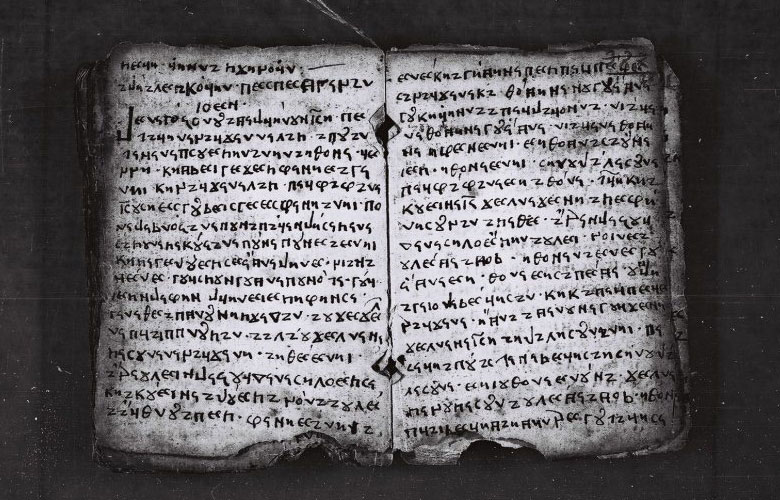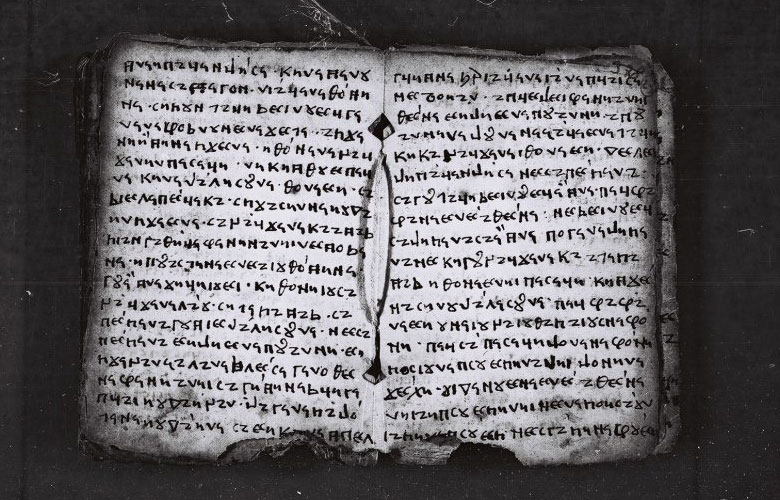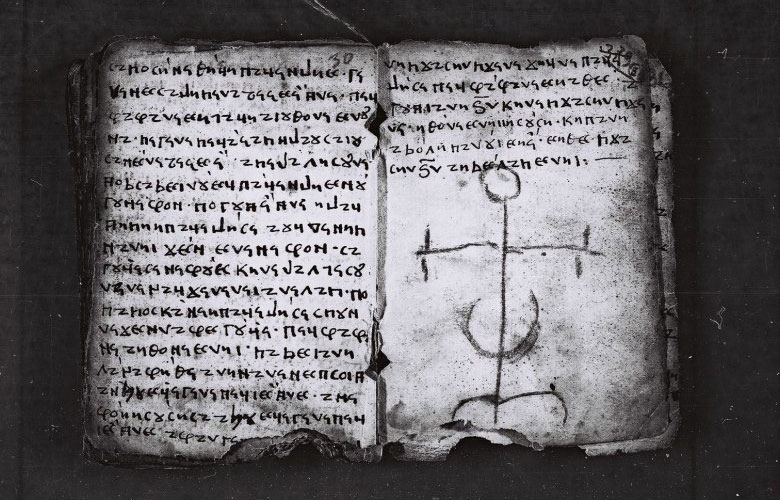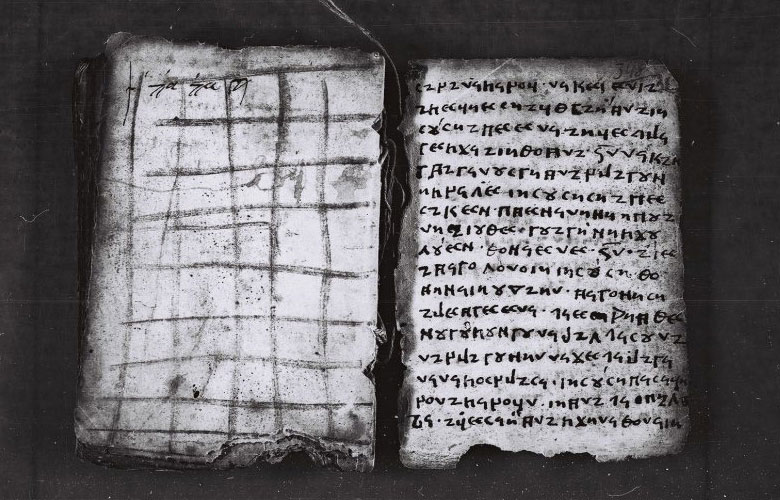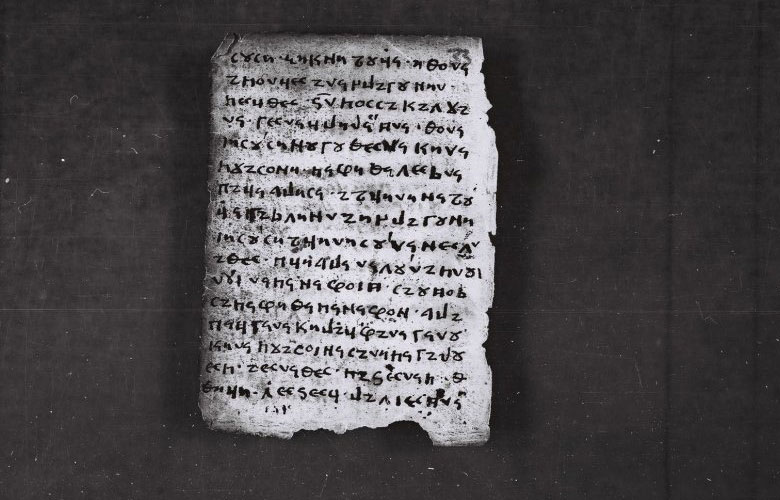| | Robert Elsie | AL Art | AL History | AL Language | AL Literature | AL Photography | Contact | |
Robert Elsie
Albanian Literature | Early Authors
GREGORY OF DURRËS
ELBASAN GOSPEL MANUSCRIPT (1761)
Pages 1 - 10 Pages 11 - 20 Pages 21 - 30 Pages 31- 40 Pages 41 - 50 Pages 51 - 61
TRANSCRIPTION
TRANSLATION
Page 51
(Matthew 27:54 = 51.01-02; John 19:31-36 = 51.03-)
e u frinë fort thanë: vërtet pe
rëndisë bir ë ky. e Judheit mos
jesë më kryqt shtati të shëtynë,
se qe e premte, se ishte ditewere terrified and said: Surely he is
the Son of God. As it was Friday,
the Jews, so that the body not remain
on the cross on Saturday since51.05
e madhe ajo e shëtunë, pyetnë
Pilatnë ti thyejnë gjynjëtë
e u nisnë. erdhë trimatë e të [p]a
rit i thyenë gjunjët ende tjetë
rit të kryqzuam me të. e mbë JiSaturday was a holy day, asked
Pilate to have the knees broken
and [the bodies] taken away. The soldiers came
and broke the knees of the first man and
of the other crucified with him. And they came51.10
sunë erdhë. si e panë se ishte
vdekun, nuku ja thy[e]në atij
gjunjët, po një trimashit me
shtijë i ra ndë brinjë, e du
al [gja]k e ujë. e u pa marturito Jesus. When they saw he was
dead, they did not break his
knees, though one of the soldiers
pierced his side with a spear, and
blood and water came out. And a witness51.15
e vërtetë e tij. ca acish panë
se vërtet thotë qi nde ju besë
të kini. e u banë këto qi esaw it was true. Some of them saw that he said
it was true so that you may also believe.
These things happened so thatPage 52
(John 19:36-37 = 52.01-03; Matthew 27:55-61 = 52.04-)
shkruameja të mbushet: eshtën të
mos përzihetë me të. e tjetëra[v]
e shkruameja thotë: pa një qi ruante.
ishinë atje gra shumë cë largthe scripture would be fulfilled: Not one
of his bones will be broken. And another
scripture says: he looked on the one who was
watching. Many women were there watching52.05
ruanjënë qi u gjitnë Jisusit
prej Galilejet qi i shëbenjën a
tij. acosh ishte Maria Maγdha
lina e Maria e Jakovit e O
sia ama e e am e të birt Zevefrom a distance who had followed Jesus
from Galilee, who were serving
him. Among them were Mary Magdalene
and Mary, the mother of James and Joses,
and the mother of Zebedee's52.10
dheut. u grys nata. erth një njeri
i pëgatë prej Arimathiet
emënit Jiosif qi nde ai u psua
prej Jisusit. ky vote ke Pilati,
lypte shtatn e Jisusit. atëhesons. Night fell. There came
a rich man from Arimathea
named Joseph who had himself become a disciple
of Jesus. This man went to Pilate
[and] asked for the body of Jesus. Then52.15
re Pilati urdhënoi ta amënë
shtatnë. e muar shtatnë Jiosifi
e e pshtual ndë pëlhurë të pastrë
e e shtiu ndë vorr të rri qi goditi
prej guri e vunë gur të math më derëPilate ordered that the body be brought
[to him]. And Joseph took the body
and wrapped it in a clean cloth
and put it in a new tomb he had cut out
of a rock and placed a big stone at the entrance52.20
të vorrit votnë. e qenë atje Mari
a Ma[--------] e tjetëra [-]of the tomb [and] went away. And Mary
Magdalene and the other Mary were
Page 53
(John 09:01-08 = 53.03-)
Mari rrinte mbi vorrt.
e diela e qorrit pas pashkëvet.
Joan.
nd'atë koho tye shëdritun JSi pathere sitting opposite the tomb.
Blind Sunday after Easter.
John.
At that time, as he went along, Jesus saw53.05
njeri të verbët të lem. e pyet
njënë të psuamit e tit e i thonë: ra
vvi, qish faj ka bam gjënia e kë
tij qi verbët ë lem. përgjegjetë
Jsusi: as ky faj s'ka as gjëni e tij. poa man blind from birth. His disciples
ask him and they say: Rabbi,
what sin did the parents of this
man commit that he was born blind. Jesus
answers: Neither this man nor his parents sinned.53.10
të dëftohetë pun e perëndisë më të
se mu të më quhetë punë puna e atij
qi më ka çyam sa është dita. vjene
nata kur s'mun kush të punonjë. kur
jam ndë gjin, drita jam i gjinsë.[It is] so that the work of God be displayed in him,
for I must do the works of the one
who has sent me as long as it is day. Night
is coming when no one can work. While
I am in the world, I am the light of the world.53.15
këtë tha e pshtyni mbë dhet e u ba bal
të prej p[sh]tymet e e leu baltën[ë]
më su të të verbëti. e i tha atij:
ecë u laj ndë hurdhë të Siloamsë
qi e quajnë e çuame. vote e u laThis he said and spat on the ground and made some
mud from the saliva and washed [with] the mud
the eyes of the blindman. And he said to him:
Go wash in the Pool of Siloam,
which means Sent. He went and washed53.20
e erth tye pam. gjënia e tij e
and came back seeing. His family and
Page 54
(John 09:08-16)
ata qi e kishinë pam përpara
se verbëtë qe thoshinë: nuku është
ky qi rrinte e përderonte? tjerë
të thoshinë: ky është. tjerëtë thoshithose who had seen before
that he was blind said: Isn't this
the man who used to sit and beg? Some
said: It is he. Others said:54.05
në: i gjan atij. ai thoshte: se unë
jam. i thonë atij si tu çelë sytë?
përgjegjetë ai e thotë: NJRi qi e
quajnë JS baltë bani e ma gji
ti syvet, e më tha: ecë ndë hurHe looks like him. He said: I am he.
They say to him: How were your eyes opened?
He replies and says: The man
they call Jesus made some mud and put it
on my eyes. And he said to me: Go to the54.10
dhë të Siloamit e u laj. vojta e
u lashë e shof. i thonëte ata: ku
është ai? thotë ai: s'e pashë. u ndi
e këjo ndë Fariset qi qe përpara
verbëtë. ishte e shëtunë kur baniPool of Siloam and wash. I went and
washed and could see. They say to him: Where
is this man? He says: I don't know.
They brought to the Pharisees the man who had
previously been blind. It was a Saturday on which54.15
baltënë JSi e i çeli syt e tij. pë
sëri e puesnjënë Farisei si tu çe
lë sytë. ai ju thotë atune: baltë
më vu më syt e u lashë e shof. i thonë
prej farisheishit ca: ky njeri s'ëJesus had made the mud and opened his eyes.
Again the Pharisees asked him how his eyes
were opened. He says to them: He put mud
on my eyes and I washed and could see. Some
of the Pharisees say: This man is not
Page 55
(John 09:16-19, 09:21-22)
shtë i perëndisë qi të shëtu
nënë s'e shëkon. tjerëtë thoshi
në: si mun njeri fajtuar kë
të të gjoftuna të banjë? e mbëfrom God for he does not keep
Saturday [the Sabbath]. Others said:
How can a sinner do miracles?
A division was among them.55.05
ni ishinë mb'atë. i thonë të ver
bëtit pësëri: ti qish thua për
të qi të çeli sytë? thotë ai se
fjalëparë qe. s'mbesitnë Iudhe
it mbë atë se verbëtë qe e shefThey say to the blindman again:
What have you to say of the one
who opened your eyes? He says that
he was a prophet. The Jews did not believe
that he had been blind and could see55.10
mjen ke thirë gjënin e tij ta shofë
në. i pyesnjinë ata e ju thoshinë:
ky është biri juaj qi thoni ju se
verbëtë leu? si njëme shef? s'e
pamëte. kush ja çeli sytë? na s'euntil they called his family to have a look.
They asked them and said:
Is this your son whom you say
was born blind? How he can see now? We
don't know. Who opened his eyes? We don't55.15
pamëte. ai di. atë pyetni. ai
mbë vet'he le të flasë. këto tha
në gjëni e tij se kishinë frikë
prej Iudheivet nde këtë medo
njënë Iudheitë se ai q[---]të shpalknow. He knows. Ask him. Let him
speak for himself. His family
said this because they were afraid
of the Jews, for the Jews had decided
that anyone who acknowledgedPage 56
(John 09:22-29)
krishnë, xcjerrë të jetë prej si
nagoiet. e pradaj gjëni e tij
thanë: ai di. atë pyetni. e py
etnë të dytënë herë atë njeri[him as] Christ would be put out of
the synagogue. And this is why his family
said: He knows. Ask him. And
a second time they asked the man56.05
qi qe verbëtë. thotë ai: dha la[v]
di perëndisë. na s'e pamëte
se ky njeri fajtyar është. përgje
gjenë ata e thanë: na fajtyar
s'e dimëte se është, po këtë dimëwho had been blind. He says: Give glory
to God. We do not know
if this man is a sinner. They
answer and said: Whether he is a sinner or not
we don't know, but this we know,56.10
të na qi ky verbëtë qe e njëme
shef. i thonë atij pësëri: qish ba
ne? si t'u çelë sytë? përgjegje
të ai: unë juve ju them e ju s'nëgjo
ni. përse pësëri do të nëgjoni?that this man was blind and now
he can see. They say to him again: What
did he do? How did he open your eyes? He
answers: I have told you and you do not
listen. Why do you want to hear it again?56.15
mos ju të psuamit e tij doni të
baχi? u jdhënuanë ata e thanë
ti je i psuam i tij. na të Moiseut
jemi të psuam. na s'kemi nëgjuamDo you want to become his disciples, too?
They were insulted and said:
You are his disciple. We are the disciples
of Moses. We have not heard
Page 57
(John 09:29-35)
se Mosinë thirri perëndia. kë
të na s'e dimëte gëha është. për
gjegjetë ai njeri e ju thotë aty
ne: më këtë mërehem nde u se juthat God called Moses. [As for] this
man, we do not know where he comes from.
This man answers and says to them:
I am surprised at this, that you do not57.05
s'e patë gëha ë e më çeli sytë.
shof se fajtuar perëndia nu
ku nëgjon, po kush është i der
shimi i perëdisë e urdhënim
n e tij ban, atë nëgjon. seknow where he comes from and he opened my eyes.
I know that God does not listen
to sinners, but listens
to the godly man who does
his will. For it has57.10
kurrë s'ë nëgjua qi të çelnjë sy
të të verbëtë të jetë lem. po
me mos qenë i perëdisë, s'mun
të bante gja kurrë. përgjegje
në e i thonë atij: me faje tinever been heard of that the eyes
of a man born blind have been opened.
If he were not from God, he could
never have done anything. They answer
and say to him: You were born57.15
leve gjithë, e ti ne të na psojsh?
e nxuarrë këtë përjashta. e në
gjoi Isusi se e xuarë këtë për
jashta e gjet kë [-----------]wholly in sin. How dare you lecture us!
And they threw him out. And Jesus
heard that they had thrown him
out and found him ............Page 58
(John 09:35-38)
ti mbesit mbë të bir të perë
disë? përgjegjetë ai e tha:
kush je ti ZT qi të mbesit mbë
të? i thotë atij Jisusi: qi pe tiDo you believe in the Son of
God? He answers and said:
Who are you, Lord, that I may believe in
you? Jesus says to him: He is [the one] whom you58.05
e foli me tuj, ai ë ai tha: mbe
sit ZT e i falem atij.
have seen and who has spoken to you. He said: I
believe, Lord, and I worship him.
Page 59
PA PA T[-]
.............
Page 60
(John 11:32-39)
se vetë më vor të qaj atje.
e Maria si erth ke ishte Ji
susi, e pa atë e i ra ndë
kambë e ji thoshte: ZT të qenthat she was going to the tomb to mourn there.
And when Mary arrived where Jesus
was, she saw him and fell to his
feet and said to him: Lord, if you60.05
kshe këtu s'kishte vdekun
im vëlla. Jisusi si e pa
se qan, pshanëtini. i pue
ti e ju tha: ku e kini mbu
luan. thonë ata: ZT ejahad been here, my brother would not
have died. When Jesus saw her
weeping, he groaned. He asked her,
saying: Where have you buried
him? They say: Lord, come60.10
e shëko. lotoji Jisusi. tho
shinë Jiudheit: shëkoni si
e dashka atë. një acish tha:
nuky mun ku të çelnjë sut e
te vdekunit të banjë nde këand see. Jesus wept.
The Jews said: See how
he loved him! One of them said:
Could not he who opened the eyes
of the dead man keep this man60.15
të të mos vdesë? Jisusi pësëri
vote më vort. jishte një spell
gë e rrasë ishte mbi të. thotë Jifrom dying? Jesus once more
went to the tomb. There was a cave
and there was a stone on it. Jesus
Page 61
(John 11:39-43)
susi hiqni gurrë. i thotë
e motra e të vdekunit
Martha: ZT, mos se qelbe
të katër diç është. thotësays: Take away the stone. Martha,
the sister of the dead man,
says to him: Lord, do not, for he
has been rotting for four days. Jesus61.05
Jisusi nuku tha[t]ë qi të
mbesoni më gjithë laf të
perëndisë? e gritinë gu
rrë ke flinte i vdekuni.
Jisusi griti sutë naltsays: Did I not say that if
you believed, [you would see] all the glory
of God? They took away the
stone where the dead man was lying.
Jesus raised his eyes61.10
e tha: prindë të lutem tuj
tyj të më nëgjojsh se u shof
se më gjithë më nëgjon nde
për këtë qi dergjetë këtu
qi të mbesojnë se ti më ke çuand said: Father, I beg you
to hear me, though I know
that you always hear me, [but I said this]
for the benefit of the people standing here,
that they may believe that you sent61.15
am. e atë tha, me za të m[a]th
thiri: Llazar del jashtë.me. And saying this, he called
in a loud voice: Lazarus, come out.
Pages 1 - 10 Pages 11 - 20 Pages 21 - 30 Pages 31- 40 Pages 41 - 50 Pages 51 - 61
TOP
